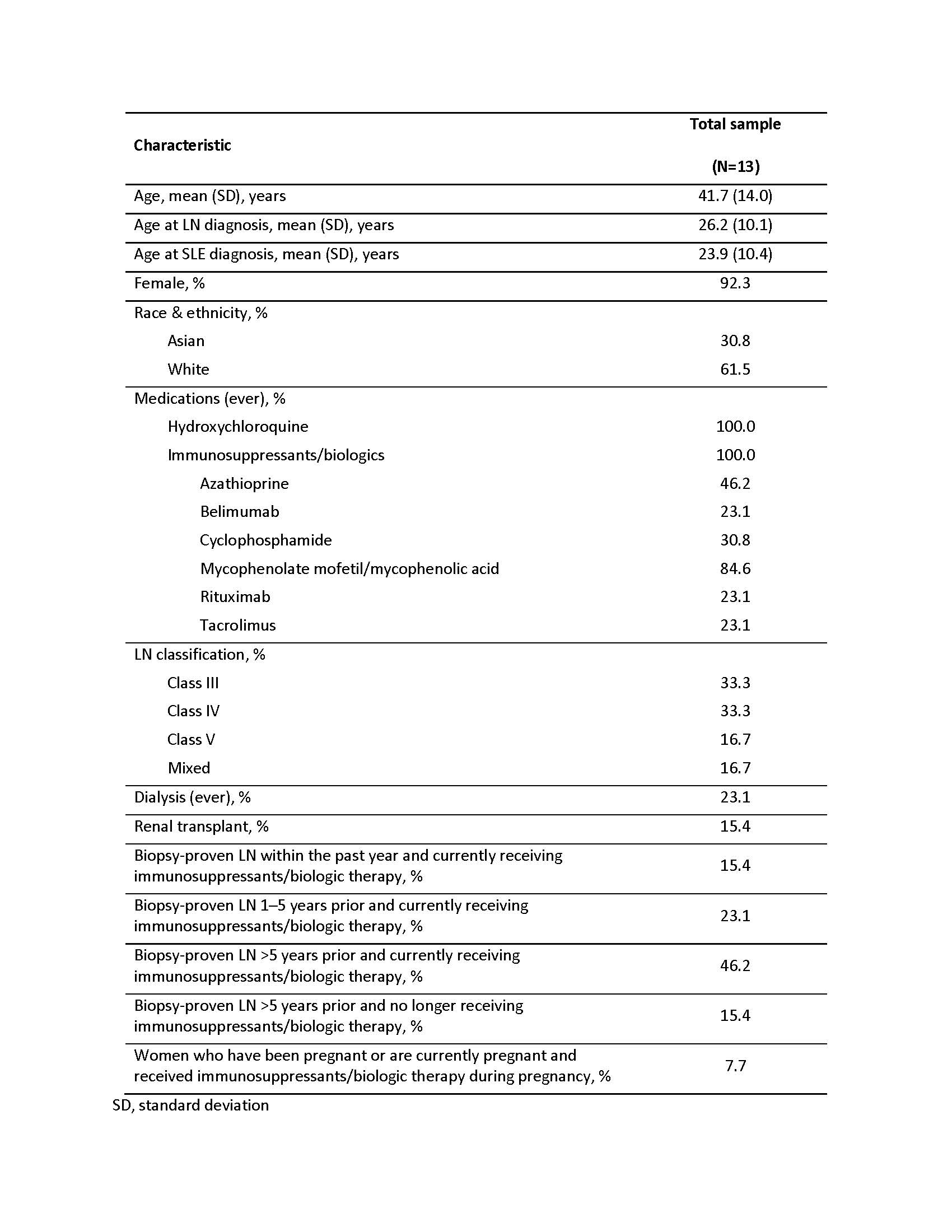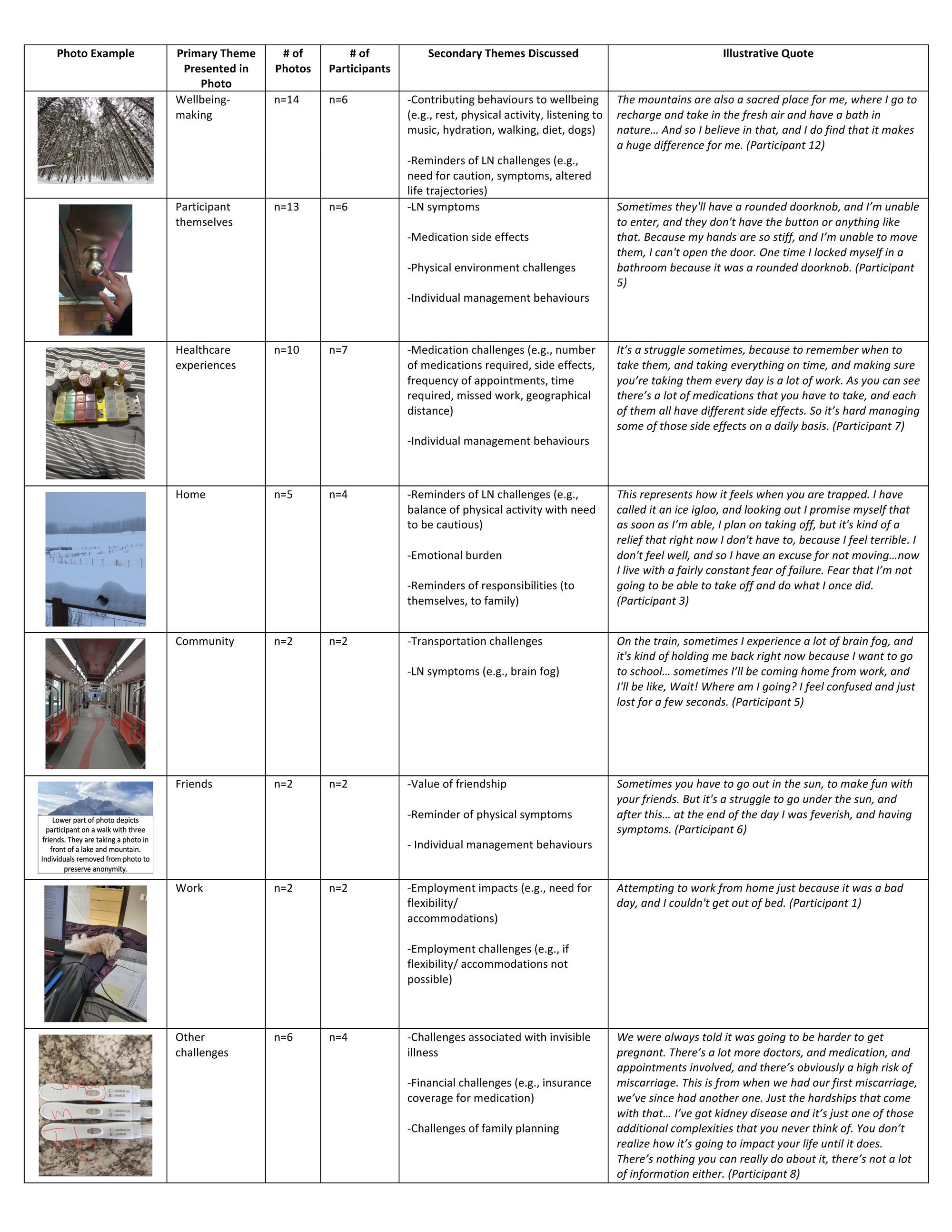Session Information
Date: Tuesday, November 14, 2023
Title: (2019–2038) Patient Outcomes, Preferences, & Attitudes Poster III
Session Type: Poster Session C
Session Time: 9:00AM-11:00AM
Background/Purpose: LN is a major cause of morbidity and mortality and develops in up to 60% of adult SLE patients. The experiences of patients with SLE have been explored quantitatively and qualitatively. However, we know little of the lived experiences of patients with LN. This research used a social constructionist perspective to explore patient experiences and perspectives of LN.
Methods: Patients aged≥18 years with biopsy-proven pure or mixed ISN/RPS Class III, IV, or V LN and fulfilling the ACR 1997 or SLICC 2012 Classification Criteria for SLE were purposefully recruited from a Canadian lupus cohort to participate in an innovative photovoice exercise. Over a 2-week period, participants took photos of what LN means to them, how LN impacts their daily life, and factors that impact how they manage their LN. Photos (3–5 participants) were shared and discussed in two virtual focus groups. Discussions were transcribed verbatim for subsequent thematic analysis using NVivo Software.
Results: Thirteen patients withLN participated; 92.3% were female, mean (SD) age was 41.7 (14.0) years (Table 1). Of the 54 photos, images depicting activities/settings that contribute to wellbeing (n=14), the participants themselves (n=13), healthcare experiences (n=10), home (n=5), work (n=2), community (n=2), friends (n=2), and other challenges (n=6) were shared (Table 2). All participants described the physical (e.g., fatigue, joint pain, rash) and psychosocial (e.g., fear, stress, social exclusion, feeling trapped, grief, and loss) impacts of living with LN. Although twelve discussed activities that contribute to well-being (e.g., listening to music, biking, walking dogs, spending time with family/friends, spending time in nature), participants were consistently reminded of their LN during/following these activities due to physical symptoms (There’d be days where my hands would cramp up and my knees would be stiff, but I just push through… because I love that experience of looking around at my surroundings, and the leaves falling (P5)), the need for caution while participating (I only rode [the bike] once, because I am always hearing my doctors very sage advice in my ear. Be careful, don’t overdo it (P3)), and altered life trajectories (My husband and I had envisioned we’d be playing with grandchildren… but I was never able to carry… [The dogs] are affectionate, loyal, and they need us… so they are sort of the light (P3); You’re always at a crossroad, you’re always having to make a decision… you have to turn left or right, you can’t keep going straight (P8)). Eleven participants discussed the need for, and burden of, medications to manage their LN; side effects (n=10) and medication-related financial challenges (n=5) were highlighted.
Conclusion: Respondents reported a substantial psychosocial burden associated with their LN diagnosis. While activities that contribute to well-being were emphasized, the physical, emotional, and lifestyle impacts of LN and the associated medication journey serve as frequent reminders of the disease burden, both now and into the future. The need for flexibility (i.e., from friends, employers, and themselves) is an essential component of navigating altered life trajectories.
Funding: GSK (GSK Study 218747)
To cite this abstract in AMA style:
Cardwell F, Elliott S, Barber M, Cheema K, George S, Boucher A, Clarke A. Exploring Experiences and Perspectives of Canadian Patients with Lupus Nephritis Through Photovoice [abstract]. Arthritis Rheumatol. 2023; 75 (suppl 9). https://acrabstracts.org/abstract/exploring-experiences-and-perspectives-of-canadian-patients-with-lupus-nephritis-through-photovoice/. Accessed .« Back to ACR Convergence 2023
ACR Meeting Abstracts - https://acrabstracts.org/abstract/exploring-experiences-and-perspectives-of-canadian-patients-with-lupus-nephritis-through-photovoice/


